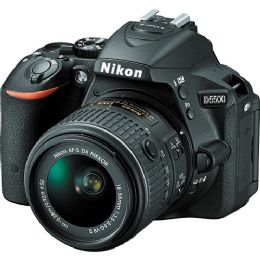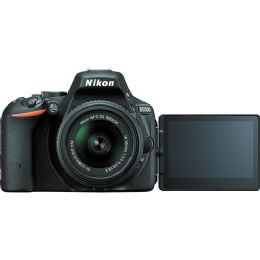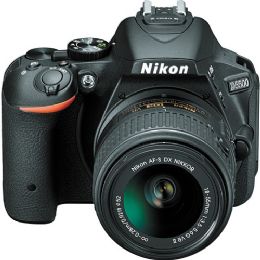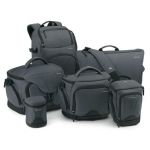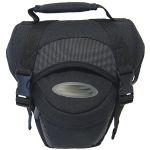A first for Nikon DSLR cameras, the black D5500 incorporates a touchscreen LCD monitor, giving you greater camera control. It features a 24.2 megapixel sensor and an EXPEED 4 image processor that provide high-resolution images and Full HD 1080p video with notable low-light sensitivity up to ISO 25600 and up to 5 fps. The optical low-pass filter is omitted from the sensor, allowing for additional sharpness in both photos and videos. The D5500 has a 39-point autofocus system with nine cross-type sensors and a 2,016-pixel RGB sensor for precise exposure metering in a wide variety of lighting conditions. Full HD videos can be shot at multiple frame rates up to 60 fps, with full-time continuous auto focusing capabilities. The D5500 also has selectable audio frequency ranges - Wide and Voice. It also has a built-in intervalometer to record up to 9,999 consecutive exposures at variable intervals.
The redesigned camera body is slightly smaller and lighter than its predecessor, and incorporates both an optical pentamirror optical viewfinder along with a large 3.2" 1,037k-dot vari-angle touchscreen LCD monitor, which features a 180° swivel design to better support working from high and low angles. A variety of touchscreen functions allow you to pinch to zoom, navigate menus, choose settings, and choose your focus point. An eye sensor turns the LCD monitor on and off, enables a Touch function, and starts the playback funtion when your eye moves away from the viewfinder.
Built-in Wi-Fi enables advanced image sharing capabilities, and when paired with an Android or iOS mobile device, remote viewing and control over the shutter release is possible from a distance.
A wide range of Picture Control modes, Scene Modes, and Special Effects modes are available as well as in-camera image editing capabilities for adjusting settings prior to sharing. Built-in HDR and Active D-Lighting modes can also be used to optimize exposure results by preserving highlight and shadow details for an extended range of apparent tones.
Included with the D5500 is the DX NIKKOR 18-55mm f/3.5-5.6G VR lens, a general-purpose zoom lens featuring a retractable barrel for a compact, lightweight design. The lens has a 35mm equivalent zoom range of 27-82.5mm, making it useful in a wide variety of shooting conditions.
24.2MP DX-Format Sensor and EXPEED 4 Processor
The 24.2 megapixel DX-format CMOS sensor and EXPEED 4 processor work together to produce overall high image quality with notable detail, dynamic range, color accuracy, and low-light sensitivity to a native ISO 12800, which is further expandable to ISO 25600. Additionally, the sensor's design omits an optical low-pass filter in order to acquire the greatest amount sharpness and detail from subjects. The EXPEED 4 processor also enables a wealth of speed throughout the camera system, including support for full HD 1080p movie recording and a full-resolution continuous shooting rate of 5 fps.
Multi-CAM 4800DX Autofocus Sensor
Benefitting the high image quality is an apt AF system that employs 39 distinct AF points, including nine cross-type sensors, to quickly acquire focus in a range of lighting conditions, from -1 to +19 EV. A unique 3D-tracking mode utilizes the 2,016-pixel RGB sensor, typically reserved for exposure metering, in order to maintain sharp focus on moving subjects. To better suit specific subject matter when working in AF-A or AF-C focus modes, Dynamic-area AF mode allows you to choose from 9, 21, or 39-point arrays for enhanced subject tracking and recognition, even if the subject briefly leaves the frame. Single-point AF, 3D-tracking, and Auto-area AF modes are also available.
When working in live view, for either still or movie shooting, a contrast-based AF system is employed to acquire focus precisely and can function in continuous, full-time servo mode to better suit working with moving subjects. Additionally, four AF-area modes are available when working in live view: Face-priority AF, Wide-area AF, Normal-area AF, and Subject-tracking AF.
AF-S NIKKOR 18-55mm f/3.5-5.6G VR II DX Lens
The 18-55mm lens has a Silent Wave Motor for quiet, quick autofocusing and also features Vibration Reduction to reduce the appearance of camera shake. The elements of the lens feature a Super Integrated Coating that nearly eliminates ghosting and reduces flaring, maintaining a crisp image throughout the frame. For general shooting, this lens features a minimum focusing distance of 9.8" in manual focus mode. A 52mm thread allows for attaching your filters or other accessories.
Touchscreen LCD Monitor
A 3.2" 1030k-dot vari-angle touchscreen LCD monitor features a 180° swivel design to better suit working from high, low, and front-facing angles.
Touchscreen functions include:
Menu Navigation
Playback: Pinch Zoom and Swipe
Live View AF Point and Shoot
Revert to Previous Layer
Touch Operation Permission
Touch for Playback Only
AF Point Selection
AF Area Mode
ISO Sensitivity
HDR
Active D-Lighting
Auto Bracketing
Viewfinder Grid Display
Aperture
Wi-Fi Connectivity
Supporting a wealth of sharing and tagging possibilities, the D5500 features built-in Wi-Fi enable seamless transferring of imagery. Once the Nikon Wireless Mobile Utility app has been installed on an Android or iOS mobile device, you can use that device to browse the contents of the memory card, select images, and seamlessly transfer files between devices for immediate sharing online. Additionally, the mobile device can remotely trigger the shutter and display a live view image from the camera to enable working from a distance.
Body Design
Even while maintaining an overall compact form-factor, the D5500 integrates a large 3.2" 1,037k-dot vari-angle touchscreen LCD monitor. Alternatively, a bright pentamirror optical viewfinder is also integrated into the design for precise eye-level viewing and real-time monitoring of subjects.
A built-in pop-up flash is also available for additional illumination when working in low-light conditions and supports Nikon's i-TTL flash metering system. A hot shoe can be used for connection and optional external flash for even greater lighting control.
Scene Recognition System and Exposure Metering
The intelligent Scene Recognition System with 3D Color Matrix Metering II utilizes a 2016-pixel RGB sensor to evaluate and analyze all aspects within a scene, including brightness, contrast, subject distance, and the scene colors, to quickly determine an accurate exposure and white balance setting to best render the scene at hand. The information gathered is also checked against onboard reference images to ensure consistency from image to image in regard to exposure, white balance, i-TTL flash settings, and subject-tracking AF performance.
Full HD Movie Recording
Full HD 1920 x 1080p movie recording is supported in 60, 30, 25, and 24 fps frame rates, as well as HD 720p and SD 480p in multiple frame rates, in the MPEG-4 AVC/H.264 format. During recording, full-time autofocus can be employed, with face-detection and subject-tracking capabilities, for ensured sharpness with a wide variety of subject types.
A built-in stereo microphone can be used to record high-quality sound or, alternatively, a microphone input is integrated into the body design to support the use of an external microphone for enhanced control over audio recordings.
Other Camera Features
Eye Sensor: Turns monitor on or off, enables Touch function, starts Playback
Live View Image Adjustments: Picture Control, white balance, exposure compensation
Permits unlimited continuous shooting with shutter speeds between 4 and 30 seconds for star trail-like imagery
Vignette control
White LCD info screen
Picture Control modes can be directly accessed via a dedicated button and allow you to set predefined looks to imagery in-camera, and include Standard, Neutral, Monochrome, Vivid, Portrait, Landscape and Flat, and can be adjusted in 0.25 steps for fine control.
RAW (NEF) files can be recorded as lossless compressed or compressed at either 12 or 14-bit depth.
Built-in HDR works to extend the tonal and exposure range of a single image by recording two separate exposures and blending them together in order to gain greater highlight and shadow details with an extended range of mid-tones.
Active D-Lighting helps to preserve both highlight and shadow details when working in contrast-rich scenarios, such as backlit lighting. Utilizing the EXPEED 4 processor's power, a more controlled image will be produced with brightness values closer to how they are naturally seen. This mode is suitable for working with moving subjects.
Scene Auto Selector is an automatic mode that intelligently identifies your subject and shooting scenario, selects a proper Scene Mode to apply, and adjusts exposure settings to best render the scene at hand.
Scene Modes: Autumn Colors, Beach / Snow, Blossom, Candlelight, Child, Close-up, Dusk / Dawn, Food, Landscape, Night Landscape, Night Portrait, Party / Indoor, Pet Portrait, Portrait, Sports, and Sunset.
Special Effects Modes: Night vision, Color sketch, Toy camera, Miniature effect, Selective color, Silhouette, High key, Low key, HDR Painting, Super Vivid, POP, and Photo Illustration.



